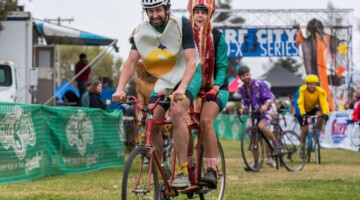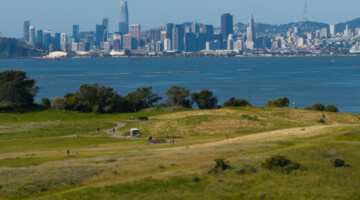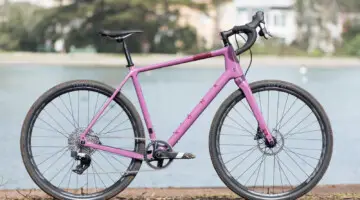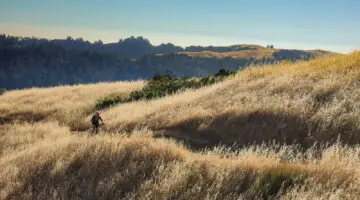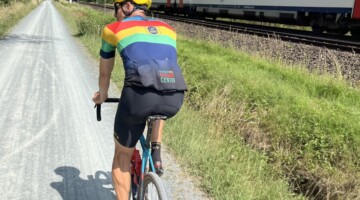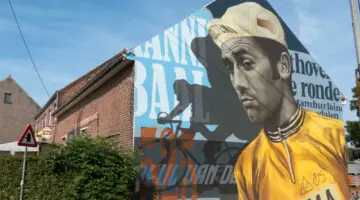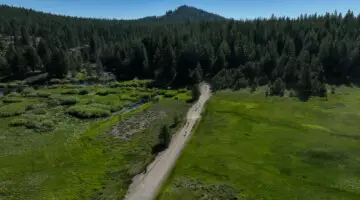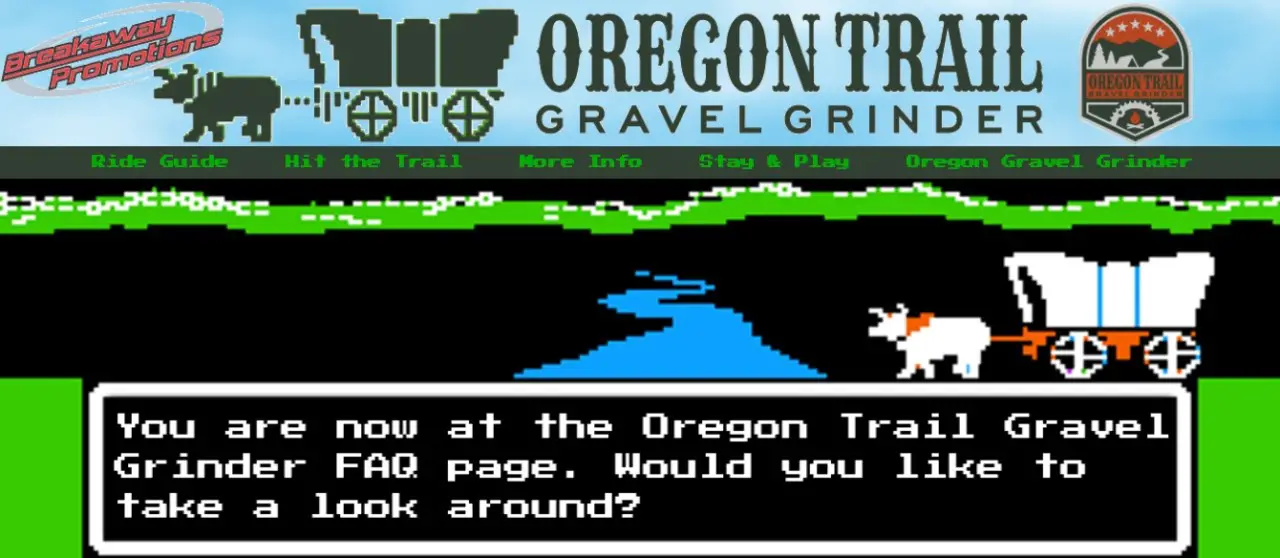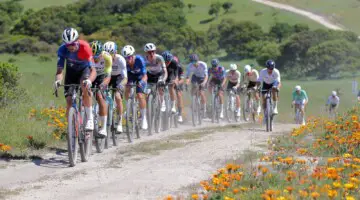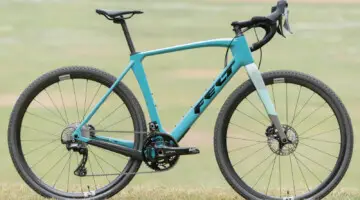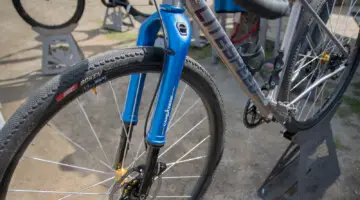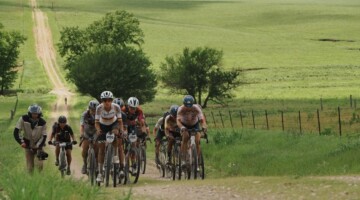What started with an off-hand idea of a way to share adventure and community—and maybe a little 90s nostalgia—with gravel enthusiasts became the new five-day Oregon Trail Gravel Grinder that started on Wednesday.
The idea started with Matt Lieto, and then Chad Sperry of Breakaway promotions took on the task of putting together all aspects of the five-day adventure. With Sperry busy wrapping up the final details of the event, Lieto took on the role of spokesperson and chatted with us two days before the race.
“It just kind of made sense if you’re doing something epic and adventurous to call it the Oregon Trail Gravel Grinder,” Lieto said. “I grew up playing the Oregon Trail video game with the ‘Wah wah, you died of dysentery.’ It’s a small part of our team, but those who remember the game are so fired up for that aspect.”
The new five-day stage race kicked off today in Sister, Oregon. The five daily routes, each 55 to 77 miles long, travel into the Cascade Mountains and circumnavigate several peaks west of Bend.
Lieto used the word “epic” repeatedly when describing the event. The event’s name is not all lip service either, the routes will include historic trails that fit the Oregon Trail moniker.
“We will be on some historic wagon roads for sections of a couple stages. It’s pretty epic. A wagon road that was made in like 1815 is pretty cool,” Lieto said.
When the gravel pioneers hit the start line this morning, Lieto and the race team had done a Conestoga wagon’s worth of work to help build a logistically sound event while cultivating a gravel vibe that fits jibes with why Lieto and the team got into the discipline in the first place.
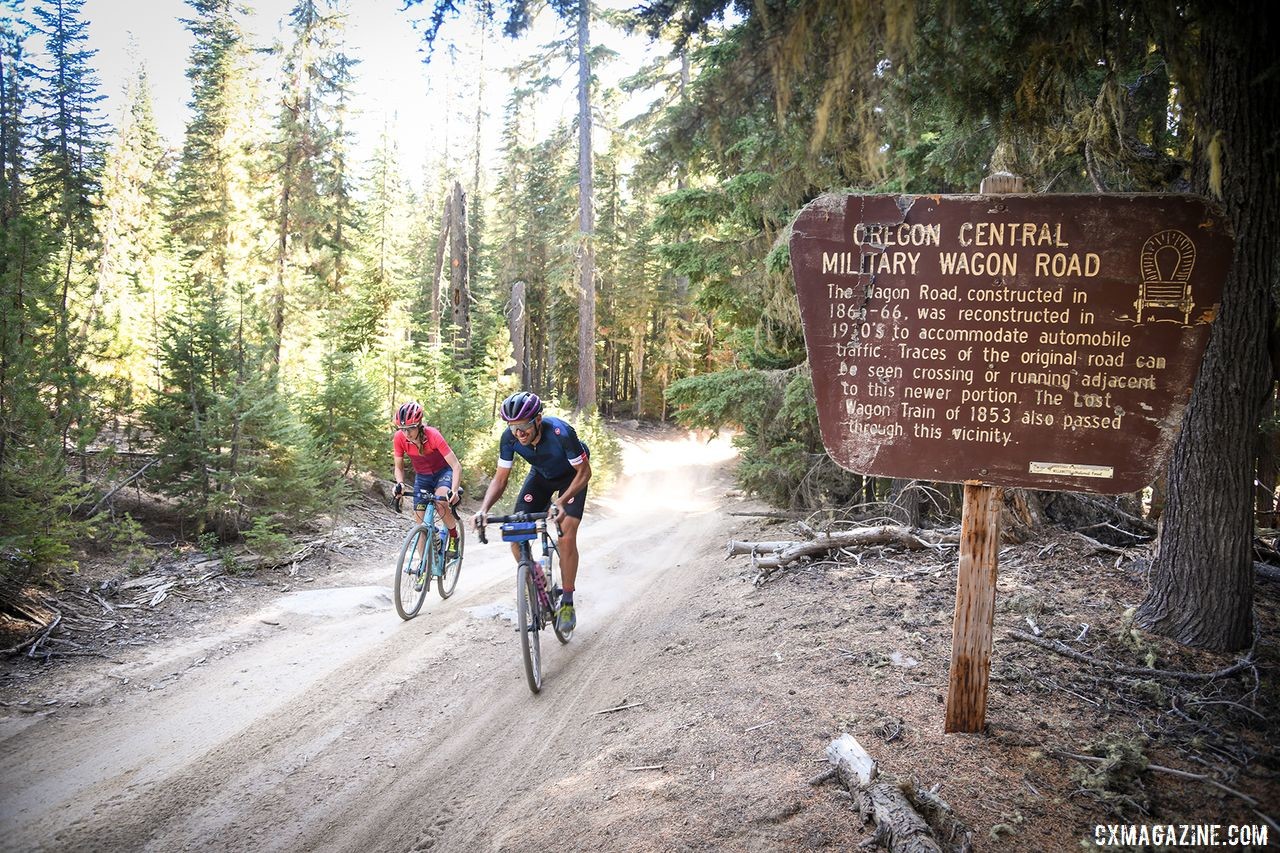
The Oregon Trail Gravel Grinder will include some historic wagon roads on its route. photo: Oregon Trail Gravel Grinder
Hitch Your Wagons for Adventure
Stage races are becoming increasingly popular in the gravel scene—we’ve covered the Tortour in Switzerland and La Grind in Kansas this year—but the genesis of the Oregon Trail Gravel Grinder goes back several years to two people who fell in love with the adventure of gravel.
“Carl Decker and I came up with the idea for the format over dinner back when we were roommates four or five years ago,” Lieto recalled.
Once they had the idea, the name also came quickly. “Carl and I did a race a couple years ago in the Dalles, which is about 120 miles from here. We rode back the next day, and we were riding our bikes on the Oregon Trail. It just kind of made sense if you’re doing something epic and adventurous to call it the Oregon Trail Gravel Grinder,” Lieto recalled.
Lieto moved to gravel after a career racing triathlons, and he is a current member of the Easton Overland Gravel Team. Gravel has appealed to him because of its sense of adventure and the strong community bonds it fosters. The Oregon Trail Gravel Grinder provides the perfect opportunity to share those two ethos with others.
“Five days gives you an option to go to some cool spots,” Lieto said. “Also, I really liked the camping experience at Lost and Found when I first did it a few years ago, and I think that will be an awesome part of this event. For me selfishly, to bring a couple hundred people out to central Oregon and have four nights of partying during the week sounds really cool.”
With a vision and plan set, Lieto needed someone to make it happen. Planning logistics for hundreds of riders over five days and hundreds of miles of Oregon’s mountainous terrain would take a yeoman’s amount of work.
Enter Chad Sperry of Breakaway Promotions. Sperry has years of race promoting experience with events such as the Mount Hood Classic, Tour of Utah and multiple national championships, and he gladly took on the logistical and planning operations.
“It’s Chad’s race. He has top-notch organizing chops,” Lieto said. “It only made sense to have him be the one to make the event happen.”
Stage races are nothing new for self-supported bikepacking races, but to have five straight days of gravel races, logistics of moving gear and food becomes a key part of a successful event. The organizers settled on a 350-mile loop that starts in Sisters and loops counterclockwise before finishing where it started.
The routes for the successive days are 77, 66, 76, 58 and 71 miles long. “Our goal isn’t to annihilate people. We want it to be a challenge, but we also have two categories offering people a shorter loop on any day that doesn’t count for the GC,” Lieto said about the route.
Decker has a few gravel miles under his wheels, and after a tour of the route, it is certainly Carl Decker Send-It Certified.
“This loop around the Cascades is a five-day event with roads most people have probably never seen,” Lieto said. “I think Carl would say he’s seen every inch of the state of Oregon, and he went on a moto trip to preview the course and he was like, ‘This course is sick.'”
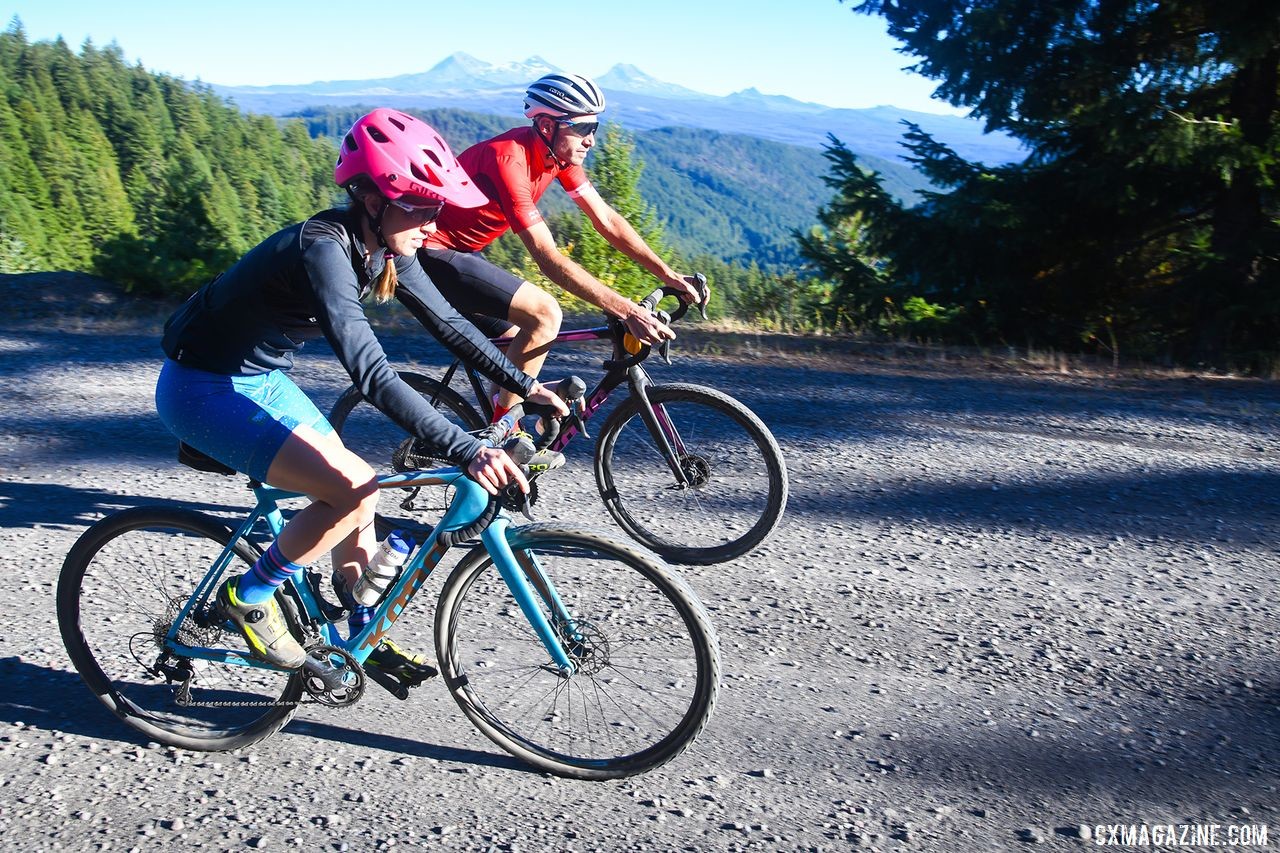
Organizers designed the stage race as an adventure with plenty of gravel grinding in store. photo: Oregon Trail Gravel Grinder
Gravel has grown in popularity thanks in part to the more relaxed atmosphere it has compared to some other disciplines. Any report from any gravel event will talk about meeting old friends and making new ones. For Lieto and his team, fostering a sense of community was perhaps the most important part of planning for the Oregon Trail Gravel Grinder.
As he mentioned above, the fully supported stage race approach means that participants will be camping in the same spot each night. In that regard, Lieto said they modeled the event after the week-long BC Bike Race mountain bike stage race. “That thing is dialed and we 100% cannot compare ourselves to that. The experience is rad and it’s an epic thing. If we can get anywhere close to that, we’ll be pretty pumped,” Lieto admitted.
Participants will have plenty of chances to relax and make new friends each night. And maybe even earn some much-coveted time bonuses. Who knows!
“We’ll be doing pioneer-style campfire games that may or may not have time bonuses associated with them to help make sure folks have a good time and realize it’s just as much about after the race as it is at the start line,” Lieto said.
Elite Gravel Pioneers
Participating in the nightly festivities will be an impressive cast of elite national-level gravel racers, including a number of riders who made the first-ever Groadio Power Rankings unveiled last week.
Part of Lieto’s work as a race organizer included reaching out to Elite racers to recruit them to help provide some cachet for the first-year race. There were, uh, some criteria he put in place.
“I’ve known Alison Tetrick for a long time and she is a badass cyclist and gravel racer,” Lieto said. “But she is also going to go toe-to-toe with me in whiskey drinking and having a good time after the race.”
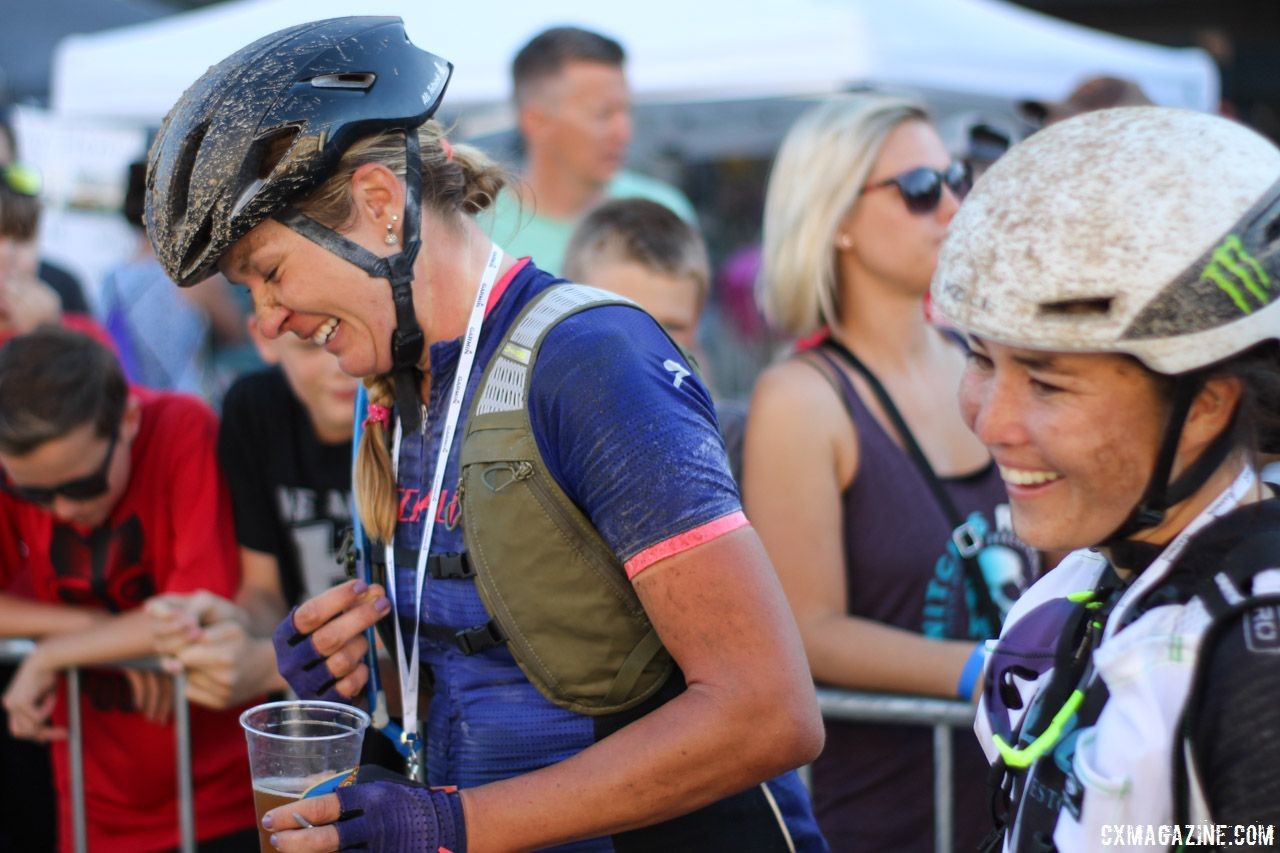
Alison Tetrick knows how to have a gravel good time. 2018 Women’s Dirty Kanza 200. © Z. Schuster / Cyclocross Magazine
Another rider who happens to be coming off the biggest win of his cycling career also made the cut, thanks in part to what he can offer to the campfire scene. “Colin Strickland reached out to me at the last minute. He was like, ‘I’m coming,’ two weeks ago. I was like, ‘I don’t know, he seems pretty serious,’ but the coolest thing, he kept texting me, ‘Is there going to be room in my bin for a guitar for the campfire?'”
For the record, there will be room for both Strickland and his guitar.
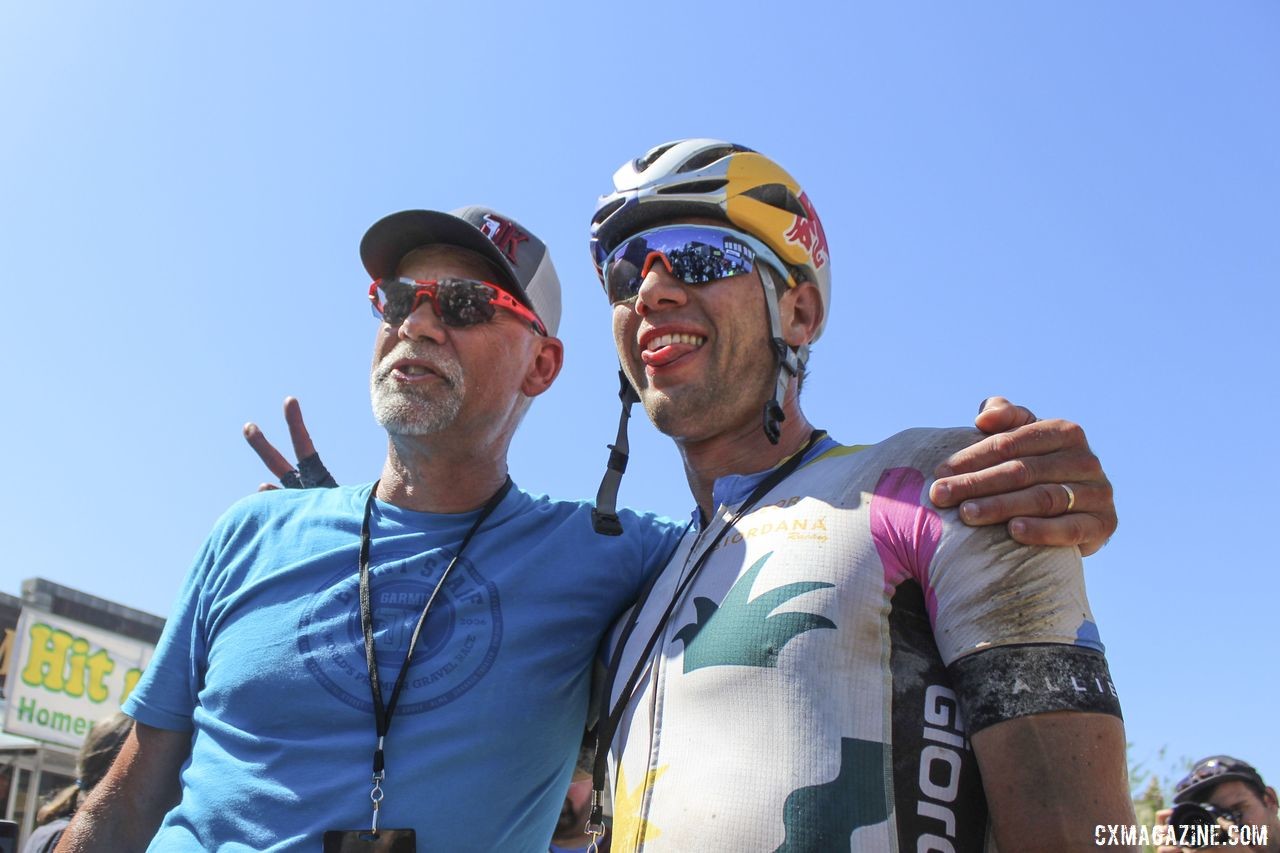
Colin Strickland and his guitar will be at the Oregon Trail Gravel Grinder. © Z. Schuster / Cyclocross Magazine
“Part of the reason we’re going to have these games is to have everyone interacting with everyone else,” Lieto said about the event setup. “People who signed up on January 1 who are from Oklahoma will be able to hang out playing guitar with Colin Strickland. As laid back as the sport is, it’s still cool to be able to rub shoulders with the best in the world.”
Joining Tetrick—second at the DK200—in the Women’s field will be, among others, Amity Rockwell (2019 Queen of Kanza), Sarah Sturm (2nd at Lost and Found), Sarah Max (3rd at DK200), Serena Bishop Gordon (3rd at Lost and Found) and Rebecca Fahringer. The latter likely needs no introduction for readers of Cyclocross Magazine.
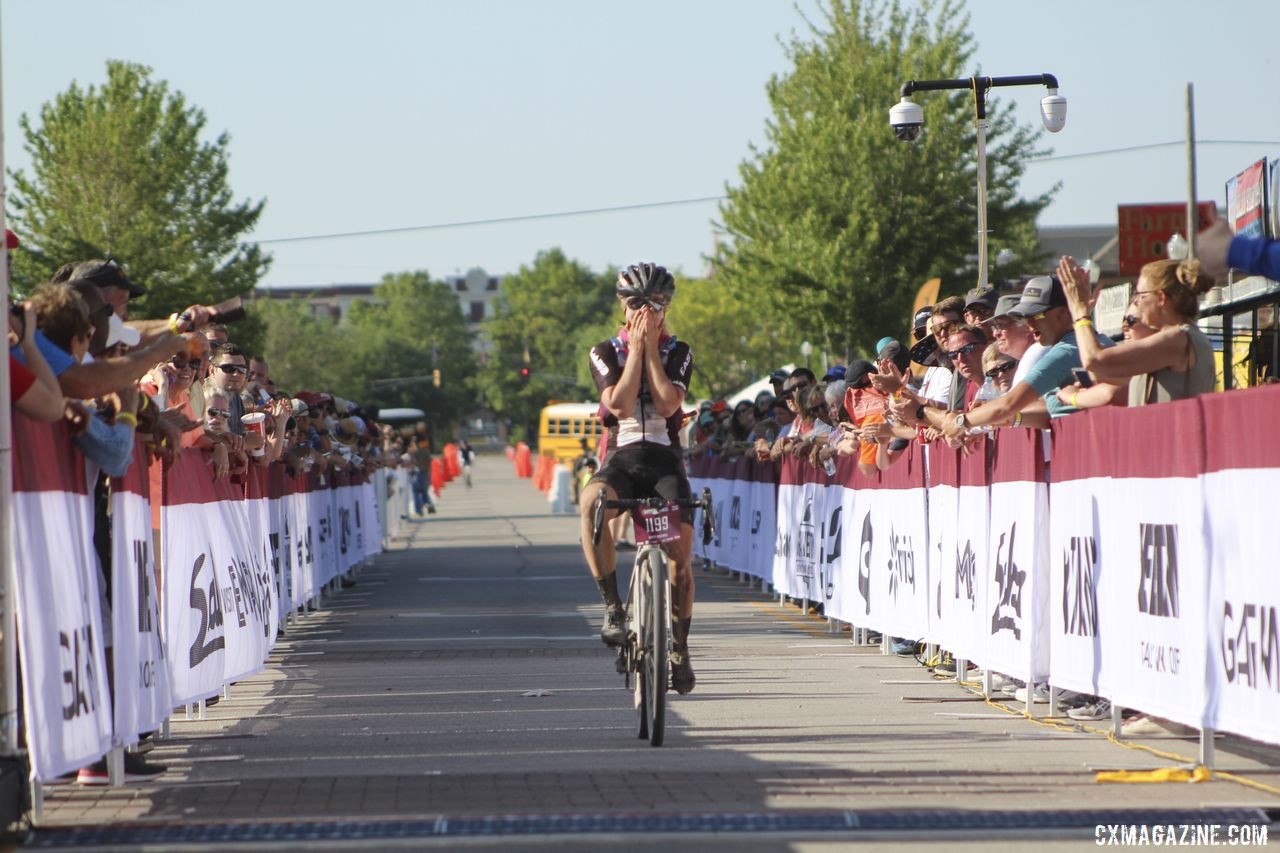
Amity Rockwell helps headline the Oregon Trail Gravel Grinder field. 2019 Open Women Dirty Kanza 200. © Z. Schuster / Cyclocross Magazine
On the Men’s side, the field includes Decker (2nd at Lost and Found), Barry Wicks (3rd at Lost and Found), Yuri Hauswald, Cody Kaiser, Tristan Uhl, Josh Berry, Kevin Girkins and Scott Chapin. (again, among others)
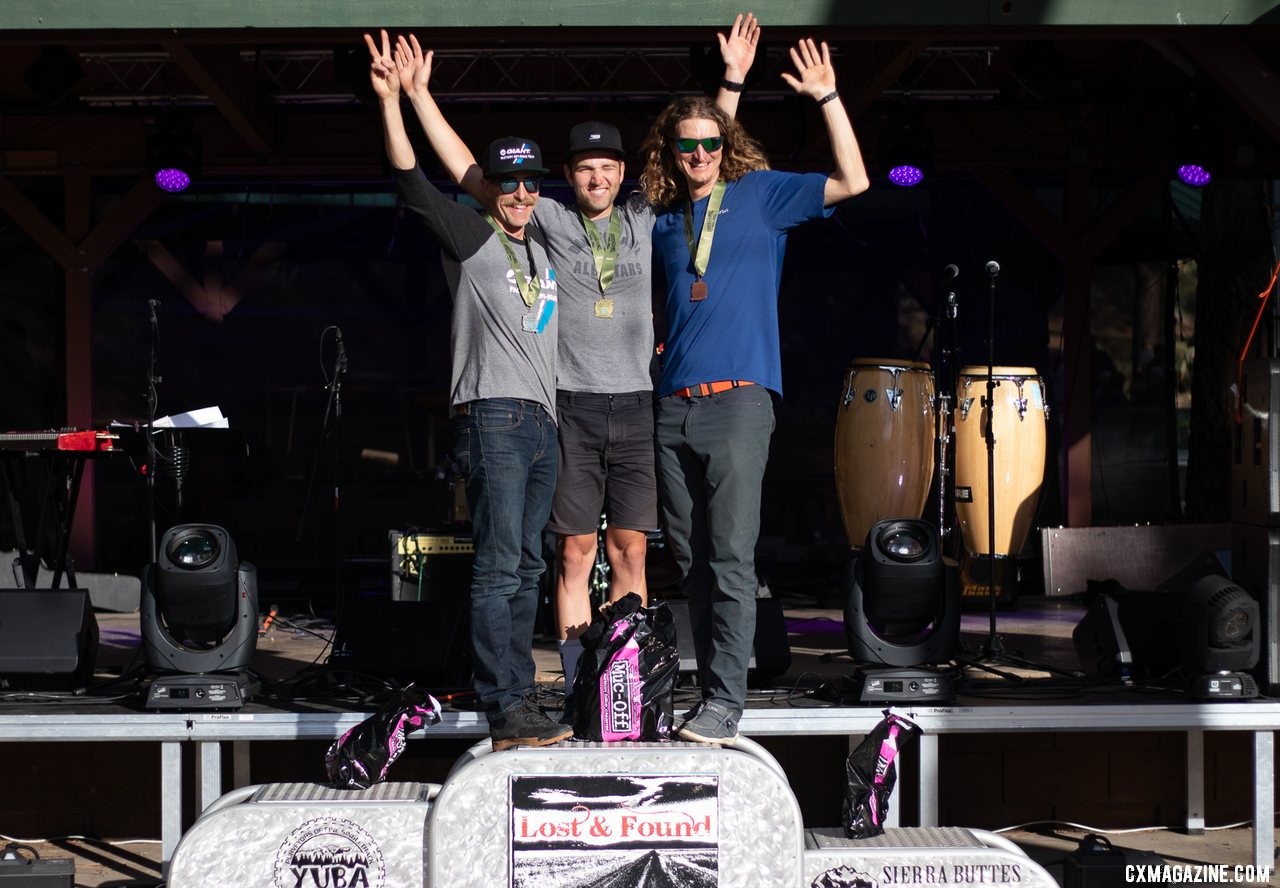
Two-thirds of the 2019 Lost and Found Men’s podium will be at the Oregon Trail Gravel Grinder. 2019 Lost and Found gravel race. © A. Yee / Cyclocross Magazine
That so many top athletes are spending a week racing gravel in Oregon is a testament to the format of the race and Lieto’s elbow grease. There are no payouts on the line, just adventure and bragging rights.
“We aren’t doing any payouts,” Lieto said. “There were a couple of athletes who hinted at it, but in the end, it’s a first-year race and the cost per person racing is extremely high. It was $800 when reg opened; that’s a lot for food and logistics and everything.”
“We feel really lucky those folks have chosen to spend time with us.”
The five-day race will be scored as a traditional time-based stage race. Time bonuses from the races themselves or the campfire games are still TBD as of press time.
Lieto said he is excited to see how the races play out. Each stage features plenty of climbing and challenges of different stripes, and Friday’s Stage 3 will serve as the Queen Stage that could have the biggest impact on the race’s final outcome.
“As an athlete, I think it’s dosing the races correctly. I think there are regional differences in race tactics, and I think maybe some of the folks will be aggressive the first couple of days, and that could mix things up.”
“Our third stage is gnarly dude. There’s a reason it happens on the Summer Solstice. People are going to need that daylight,” Lieto said about the Queen Stage.
Adventure with a Side of Nostalgia
“To separate yourself in the gravel scene these days, you have to have some sort of twist. I think the five-day thing is a big enough twist, but by also using the name, it stays true to Oregon and gives us stuff to have fun with,” Lieto said about the approach for the first-year race.
As we have learned this year, there are races of every name, size and shape on the U.S. gravel landscape. As a member of the Oregon Trail Generation, naming the race after the game I played during computer lab in grade school certainly helped get my attention.
Even better, the race has really leaned into the Oregon Trail computer game motif. Text on the website mimics the iconic Apple IIe font and the graphics are a throwback to the game as well.
For those who cannot finish the five-day race, there is even a “Died of Dysentery” t-shirt waiting when you board the “Bus of Shame.”
Adventure, community, nostalgia, Lieto is hoping it all adds up to an event that is on the gravel landscape for years to come. “We want to make a race that has adventure at the forefront and will appeal to the national gravel crowd. We want it to be a destination race people are looking forward to making a big trip out of.”
Updated 6/21 to more accurately reflect Sperry’s role in running the event.





